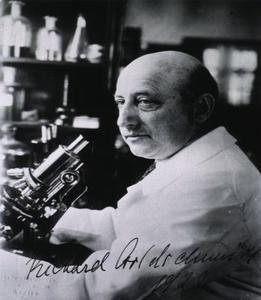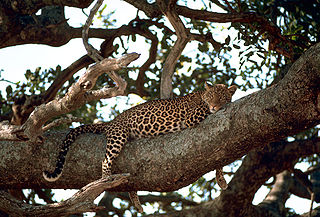Zoology is the branch of biology that studies the animal kingdom, including the structure, embryology, evolution, classification, habits, and distribution of all animals, both living and extinct, and how they interact with their ecosystems. The term is derived from Ancient Greek ζῷον, zōion ('animal'), and λόγος, logos.

Evolutionary developmental biology is a field of biological research that compares the developmental processes of different organisms to infer the ancestral relationships between them and how developmental processes evolved.

The modern synthesis was the early 20th-century synthesis reconciling Charles Darwin's theory of evolution and Gregor Mendel's ideas on heredity in a joint mathematical framework. Julian Huxley coined the term in his 1942 book, Evolution: The Modern Synthesis.

Evolutionary biology is the subfield of biology that studies the evolutionary processes that produced the diversity of life on Earth. Simply, it is also defined as the study of the history of life forms on Earth. Evolution is based on the theory that all species are related and they gradually change over time. In a population, the genetic variations affect the physical characteristics i.e. phenotypes of an organism. These changes in the phenotypes will be an advantage to some organisms, which will then be passed onto their offspring. Peppered Moth and Flightless birds are some examples of evolution in species over many generations. In the 1930s, the discipline of evolutionary biology emerged through what Julian Huxley called the modern synthesis of understanding, from previously unrelated fields of biological research, such as genetics and ecology, systematics, and paleontology. A person who studies Evolutionary biology is called an Evolutionary biologist. The importance of studying Evolutionary biology is mainly to understand the principles behind the origin and extinction of species.

William Bateson was an English biologist who was the first person to use the term genetics to describe the study of heredity, and the chief populariser of the ideas of Gregor Mendel following their rediscovery in 1900 by Hugo de Vries and Carl Correns. He is the "Father of Modern Genetics" His 1894 book Materials for the Study of Variation was one of the earliest formulations of the new approach to genetics.

Richard Benedict Goldschmidt was a German-born American geneticist. He is considered the first to attempt to integrate genetics, development, and evolution. He pioneered understanding of reaction norms, genetic assimilation, dynamical genetics, sex determination, and heterochrony. Controversially, Goldschmidt advanced a model of macroevolution through macromutations popularly known as the "Hopeful Monster" hypothesis.

Zoogeography is the branch of the science of biogeography that is concerned with geographic distribution of animal species.

BioEssays is a monthly peer-reviewed review journal covering molecular and cellular biology. Areas covered include genetics, genomics, epigenetics, evolution, developmental biology, neuroscience, human biology, physiology, systems biology, and plant biology. The journal also publishes commentaries on aspects of science communication, education, policy, and current affairs.

Phenotypic plasticity refers to some of the changes in an organism's behavior, morphology and physiology in response to a unique environment. Fundamental to the way in which organisms cope with environmental variation, phenotypic plasticity encompasses all types of environmentally induced changes that may or may not be permanent throughout an individual's lifespan. The term was originally used to describe developmental effects on morphological characters, but is now more broadly used to describe all phenotypic responses to environmental change, such as acclimation (acclimatization), as well as learning. The special case when differences in environment induce discrete phenotypes is termed polyphenism.

In biology, placentation refers to the formation, type and structure, or arrangement of the placenta. The function of placentation is to transfer nutrients, respiratory gases, and water from maternal tissue to a growing embryo, and in some instances to remove waste from the embryo. Placentation is best known in live-bearing mammals (theria), but also occurs in some fish, reptiles, amphibians, a diversity of invertebrates, and flowering plants. In vertebrates, placentas have evolved more than 100 times independently, with the majority of these instances occurring in squamate reptiles.

Evolutionary physiology is the study of the biological evolution of physiological structures and processes; that is, the manner in which the functional characteristics of individuals in a population of organisms have responded to natural selection across multiple generations during the history of the population. It is a sub-discipline of both physiology and evolutionary biology. Practitioners in the field come from a variety of backgrounds, including physiology, evolutionary biology, ecology, and genetics.

The Australian Journal of Zoology is an international peer-reviewed scientific journal published by CSIRO Publishing. It publishes original research and review articles on zoology, with a special focus on Australian fauna. It is broad in scope, covering a range of disciplines, including anatomy, physiology, molecular biology, genetics, reproductive biology, developmental biology, parasitology, morphology, behaviour, ecology, zoogeography, systematics and evolution.

Arboreal locomotion is the locomotion of animals in trees. In habitats in which trees are present, animals have evolved to move in them. Some animals may scale trees only occasionally, but others are exclusively arboreal. The habitats pose numerous mechanical challenges to animals moving through them and lead to a variety of anatomical, behavioral and ecological consequences as well as variations throughout different species. Furthermore, many of these same principles may be applied to climbing without trees, such as on rock piles or mountains.

Gerd B. Müller is an Austrian biologist who is professor at the University of Vienna where he heads the Department of Theoretical Biology in the Center for Organismal Systems Biology. His research interests focus on vertebrate limb development, evolutionary novelties, evo-devo theory, and the Extended Evolutionary Synthesis. He is also concerned with the development of 3D based imaging tools in developmental biology.
Australian Mammalogy is a major peer-reviewed scientific journal published by CSIRO Publishing on behalf of the Australian Mammal Society covering research on the biology of mammals that are native or introduced to Australasia. Subject areas include, but are not limited to: anatomy, behaviour, developmental biology, ecology, evolution, genetics, molecular biology, parasites and diseases of mammals, physiology, reproductive biology, systematics and taxonomy.

Günter P. Wagner is an Austrian-born evolutionary biologist who is Professor of Ecology and Evolutionary biology at Yale University, and head of the Wagner Lab.
Alfred Richard Wilhelm Kühn was a German zoologist and geneticist. A student of August Weissmann, he was one of the pioneers of developmental biology. At a period when biology was largely descriptive, he collaborated with zoologists, botanists, organic chemists, and physicists conducting interdisciplinary studies, examining sensory biology, behaviour, and biochemistry through experiments on organisms.

The extended evolutionary synthesis consists of a set of theoretical concepts argued to be more comprehensive than the earlier modern synthesis of evolutionary biology that took place between 1918 and 1942. The extended evolutionary synthesis was called for in the 1950s by C. H. Waddington, argued for on the basis of punctuated equilibrium by Stephen Jay Gould and Niles Eldredge in the 1980s, and was reconceptualized in 2007 by Massimo Pigliucci and Gerd B. Müller. Notably, Dr. Müller concluded from this research that Natural Selection has no way of explaining speciation, saying: “selection has no innovative capacity...the generative and the ordering aspects of morphological evolution are thus absent from evolutionary theory.”













